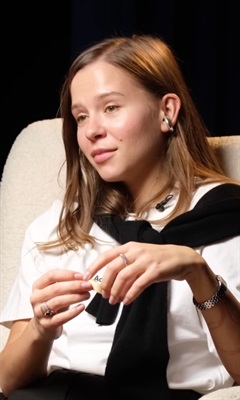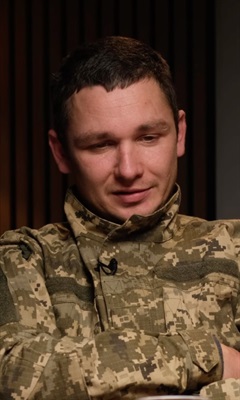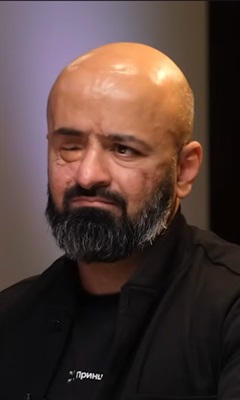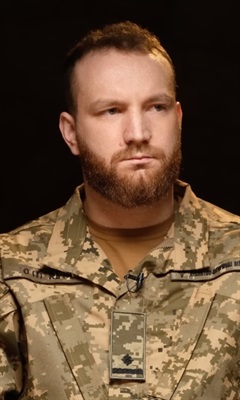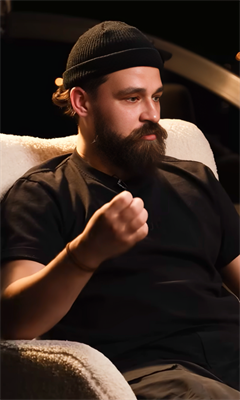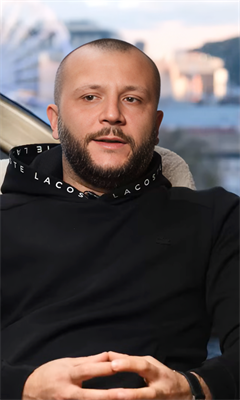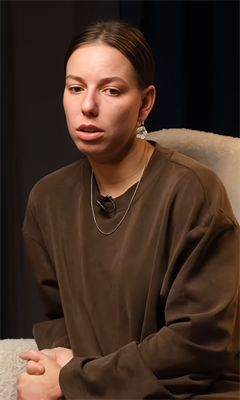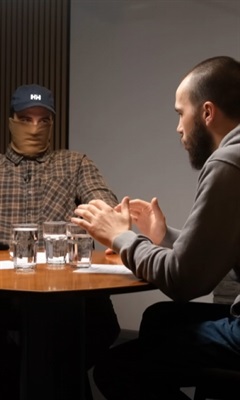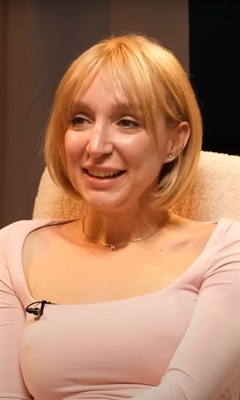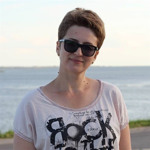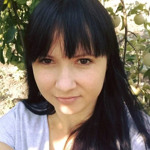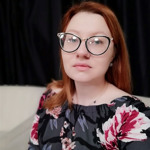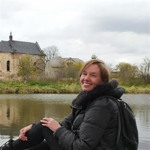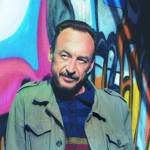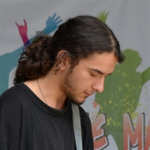Valentyna impressed the entire world on field training in Mariupol. We found out how she is doing
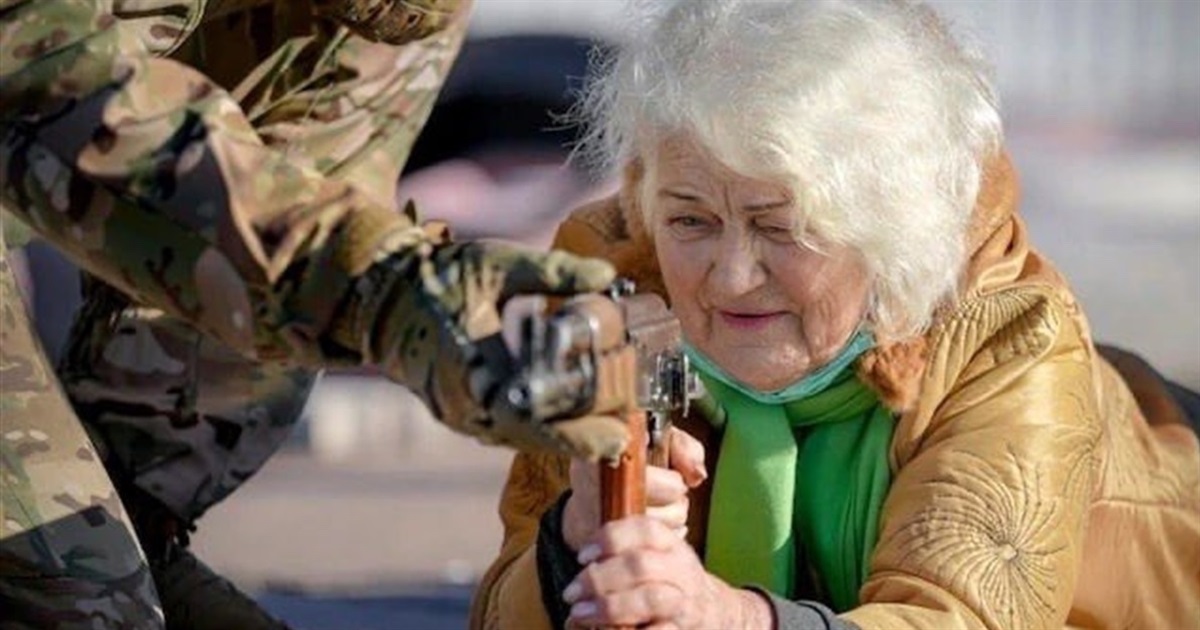
Namely, an article about the preparation of Ukraine for the Russian invasion was featured on the front page of the British newspaper The Times, while Valentyna’s picture was used as an illustration.
After February 24, the elderly woman managed to leave her home, Mariupol, on the last train. At first, she lived in Lviv, then moved to Poland, and on April 9 joined her youngest daughter in Spain.
Valentyna Konstantynovska told about her life and volunteer experience in Mariupol, the journey of learning the Ukrainian language, and her old dream that came true before the war.
The secret to learning Ukrainian
My life in Mariupol was very vibrant. I attended Ukrainian language courses, hang out with my friends; we cooked national food together, sang songs, and volunteered. In summer, we would go to Khortytsia Island, take dips in Dnipro, attend the Dyke Pole festival, and climb the Oba-Tash Mountain in the Zaporizhzhia region. We had so many plans for this summer!
I’ve lived in Mariupol since 1964. I’ve mostly worked at the Azov Shipping Company in the Economic Education Department. But I took breaks to look after my kids, because my husband believed that if he could provide for us then I should take care of the kids. So, with such an approach, my career path wasn’t great. I’ve raised two kids, two daughters. I helped them raise my grandkids because both my daughters were working.
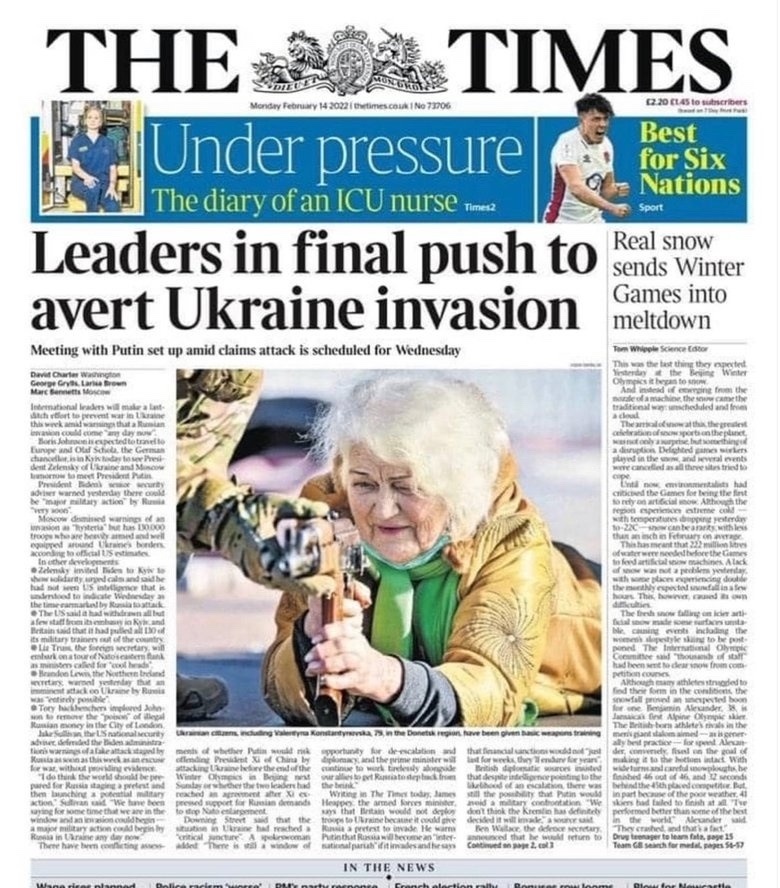 Newspaper’s front page featuring Valentyna Konstantynovska
Newspaper’s front page featuring Valentyna Konstantynovska
I’ve spoken Russian my entire life. That’s how it was at that time: starting from kindergarten, ending with the academy — one was surrounded by the Russian language. I come from Dnipro. We lived near a Ukrainian school, and my brother started his education there. When I went to school two years later, the school became Russian-speaking, and the Ukrainian one was transferred to the suburbs of then-Dnipropetrovsk. The city was Russian-speaking, so the people spoke either Russian or a mix of the two languages.
Only as an adult, when my younger brother got married, his wife and I decided to speak Ukrainian at home. We spoke to the best of our abilities. One thing about me is that I’m a bit of an overachiever. So I bought lots of books in Ukrainian and started reading them out loud, articulating every word and expanding my vocabulary. I also loved to sing, especially the songs of our fellow Donetsk singer Anatolii Solovyanenko. I was lucky to buy a couple of Ukrainian embroidered shirts. I wore them to work with great pleasure.
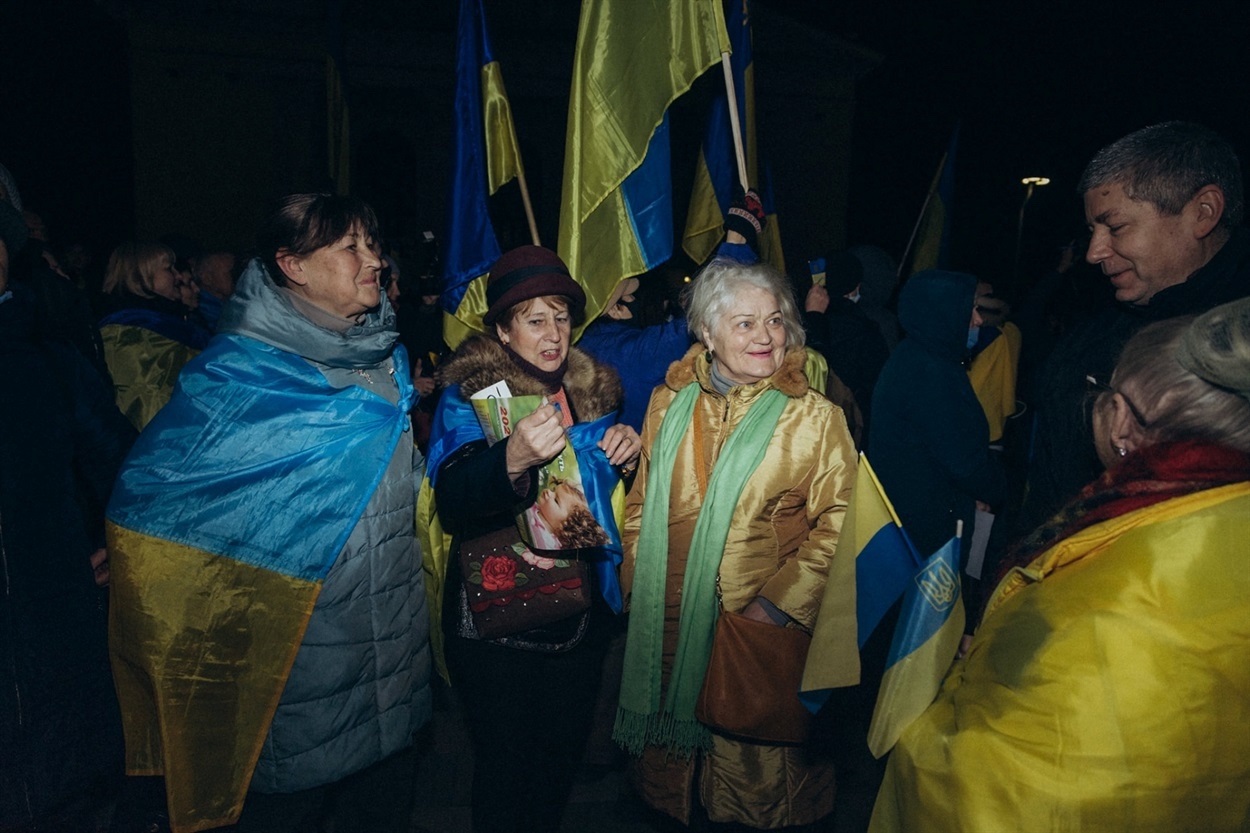 Valentyna Konstantynovska on a protest in Mariupol on February 22, 2022. Credits: Valentyna’s archive
Valentyna Konstantynovska on a protest in Mariupol on February 22, 2022. Credits: Valentyna’s archive
When in 2014 the Russians became an open enemy to us, Ukrainians, I returned to my method of language learning. I had a schedule: I woke up, did some exercises (without a fail), had breakfast, and then started reading. I got three volumes of Ukrainian dissident Levko Lukyanenko. So I read his works out loud, articulating every word. I did so to train the proper movement of lips and jaw.
I could talk and sing in Ukrainian quite well, but I wanted to learn how to speak proper Ukrainian. So I signed up for Ukrainian language courses, as well as for the classes conducted by Taras Shevchenko’s All-Ukrainian Prosvita Society. We were taught the correct emphases. We read the works of various poets and writers. We also put on plays and even rented a bus to go on field trips with like-minded people. Both the courses and the classes were free.
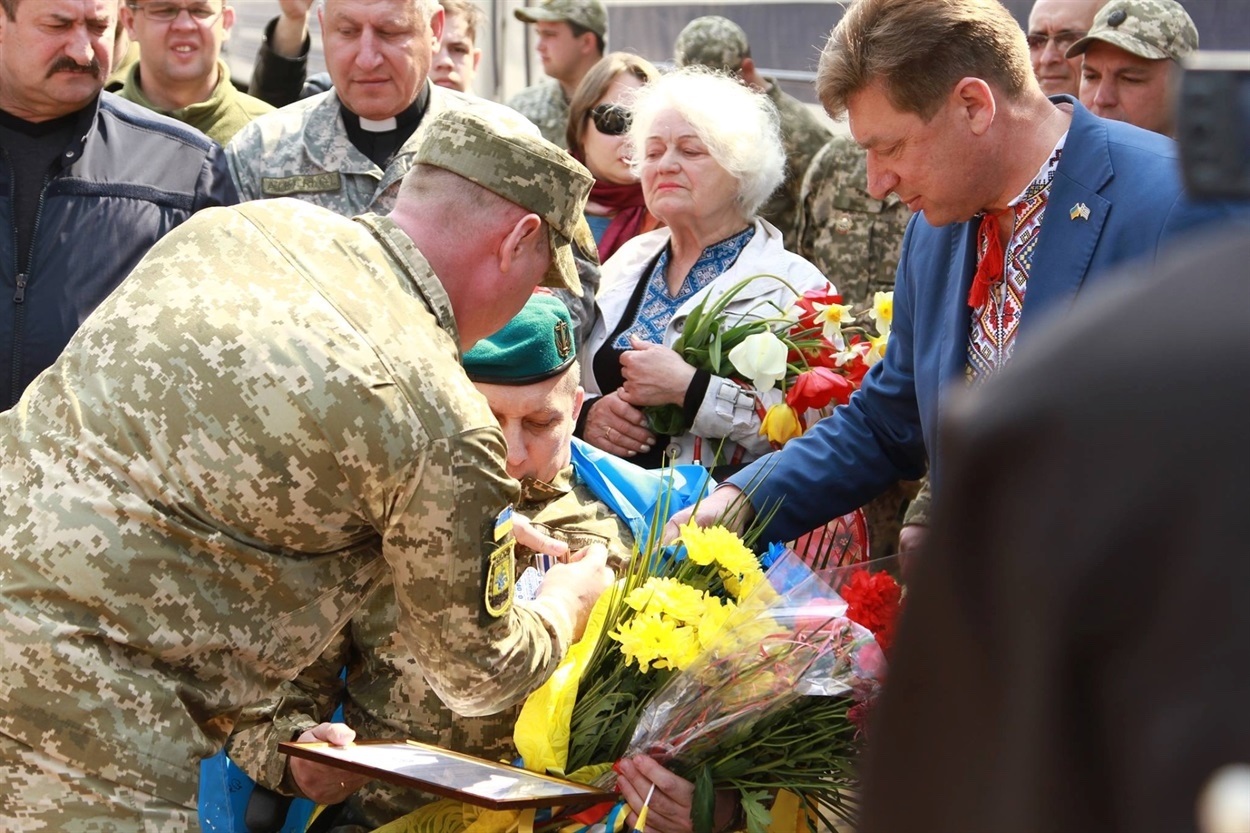 Valentyna Konstantynovska in Mariupol. Credits: Valentyna’s archive
Valentyna Konstantynovska in Mariupol. Credits: Valentyna’s archive
Three awards for volunteering
In 2014, many of our acquaintances and neighbors attended the so-called referendum resulting in the creation of the so-called DNR. Meanwhile, the Ukrainian flag was hanging on the wall of our apartment. My older daughter and I were so horrified by the news that we decided to do something. We drove our car to the city borders, to Ukrainian checkpoints, and gave food to our boys.
At first, we did it on our own, and then a renowned volunteer and teacher found out about this and suggested doing this together. I joined their team. Together with other women I cooked borshch, soups, pies, and dumplings, while younger volunteers delivered food.
Then we started gathering warm clothes for our men. We bought sweaters, and coats from thrift stores. We washed them and then delivered them wherever they were needed. Then the heatwave came, and t-shirts and shorts were in need. All those men had were the clothes on their backs, just like us, refugees, now.
We also collected bowls, spoons, and tents for our military. Then we started sewing balaclavas. The fabric came in rolls. Some volunteers were cutting, and others were sewing.
But I was dissatisfied the entire time. I thought I wasn’t doing enough. So later I joined the New Mariupol volunteering organization, where I started making masking nets and masking costumes, seat cushions for tanks, and belts for artillerymen. I received three awards for my volunteer work. Two of them were from the primate of the Orthodox Church of Ukraine Epiphanius. One of them he presented to me personally during his visit to Mariupol; the seсond one I received on the Heavenly Hundred Heroes Day, on February 20.
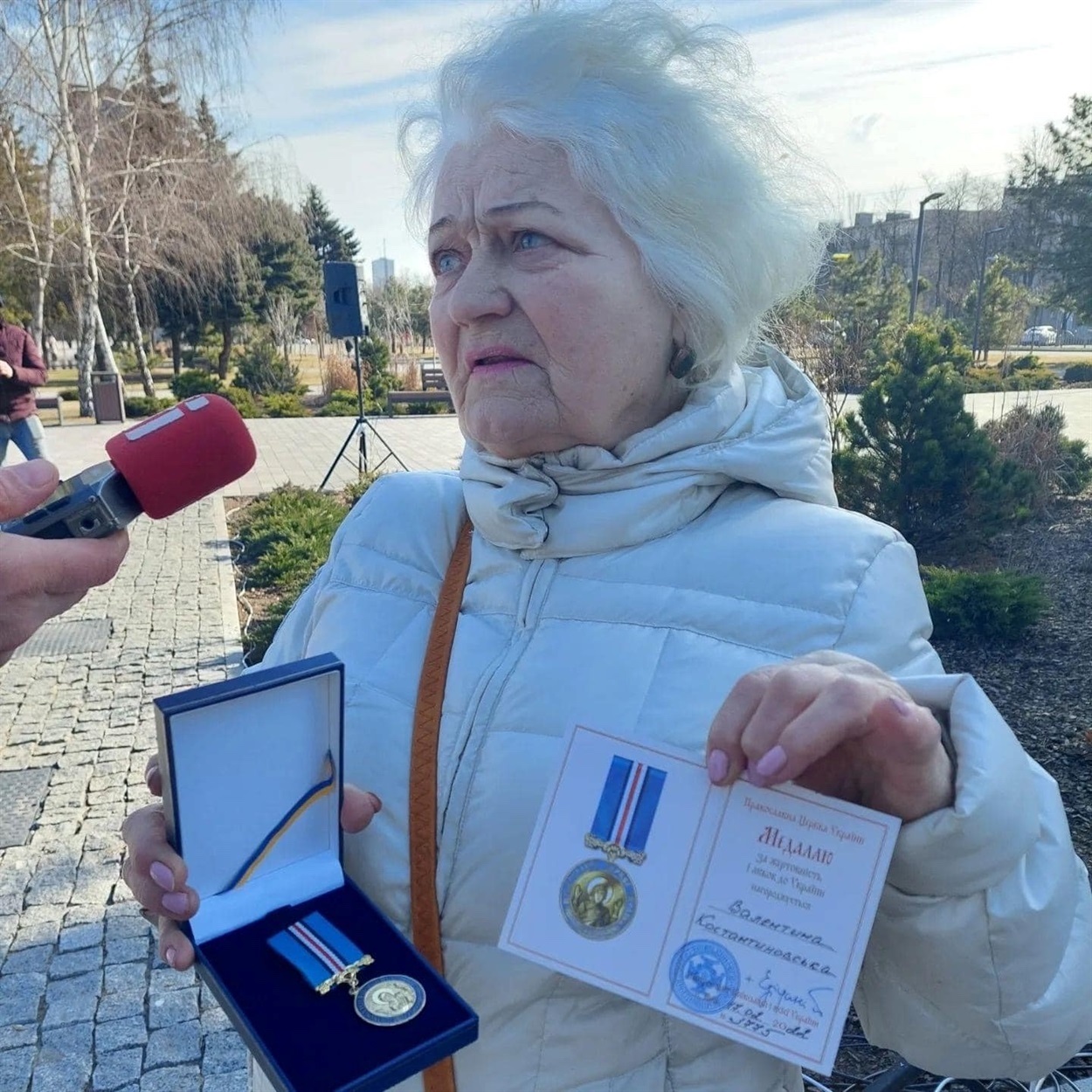 Valentyna Konstantynovska showing awards for her volunteer work. Credits: Valentyna’s archive
Valentyna Konstantynovska showing awards for her volunteer work. Credits: Valentyna’s archive
Execution lists
After the full-scale invasion, we continued working at the volunteer headquarters. We made nets because the demand was big and we had to work every day. Even though the situation in the city was getting tense, my friends and I decided to stay in Mariupol. They have their son’s grave here. I have my husband’s grave here. And where would we go anyways?
I was convinced then that I would be useful in Mariupol. We, elders, would stay, we would support each other, while the youngsters should get to safety. With this approach, other volunteers and I continued making nets.
But my kids and fellow volunteers teasingly said, “If things get bad, you will be the first in the execution line. They’ll kill you, execute you, put a noose on your legs and you’ll be hanging for a long time.” They’ve made up scenarios to scare me. I guess I was too careless about this. My hatred for invaders was so great that I didn’t feel fear. I thought that if I didn't kill at least one of them, I’d bite them.
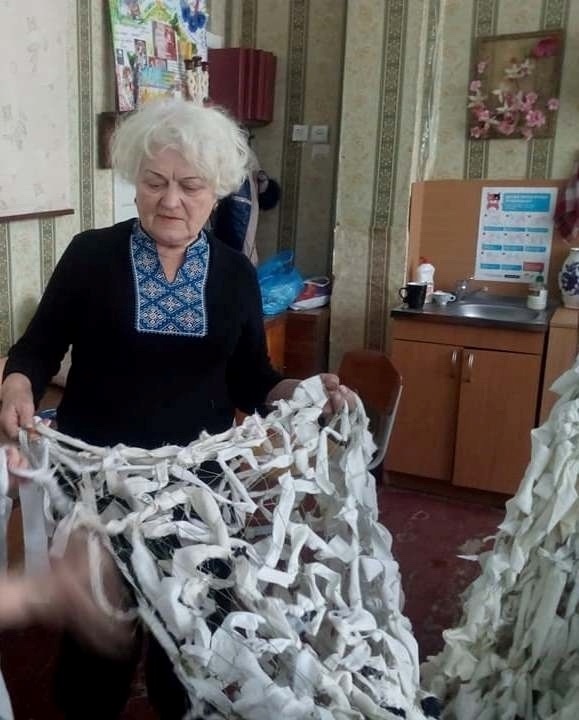 Valentyna Konstantynovska making a masking net. Credits: Valentyna’s archive
Valentyna Konstantynovska making a masking net. Credits: Valentyna’s archive
My kids, knowing my intentions, decided to get me out of, as it now turned out, hell. One day I went to the headquarters and started working when I suddenly received a call from my granddaughter. She lives and studies in Lodz, Poland. She said that she needed urgent help — both she and my great-granddaughter got sick. My granddaughter expected her mother — my daughter — to come and help her. But something came up and I was the only hope.
I quickly boarded the train. Only when my small backpack and I were inside, did I find out that that was the last train from Mariupol. I had left my gas boiler turned on at home because I thought that I wouldn't be gone for long. I realized that I wouldn’t return for a long time — or at all — only on the train. And then I felt such shame and pain for leaving my friends behind. It felt as if I’ve betrayed them. But they stayed, they didn’t intend on leaving. They said, “Where would we go, who needs us? We don’t have money for this…”
Last dream from the peaceful life
It would take too long to tell everything, so long story short: with the help of Lviv volunteers I got food and a place to sleep. The next day I met my daughter and grandson in Chervonohrad. We talked, we hugged, and then went to Poland. My grandson stayed in Lviv: he turned 18 on February 23. The war started the next day. He wasn’t allowed to leave to study in Poland; they had tickets for February 26.
I found out that I was coaxed out of Mariupol in a week, during a phone call with my grandson.
I was mentally prepared for the war because it started not on February 24, but in the spring of 2014. How did a rifle get into my arms? When I was young and we visited my acquaintance, he brought out his dad’s rifle and we started shooting, taking turns. As per usual, my turn was the last one, after everyone else was done shooting, so I wouldn’t get distracted and nobody would take the rifle from me.
I started shooting and I hit the same place on the bull’s eye a couple of times. Everyone was surprised. Then, when they looked closely at the way I aimed, it turned out that I was aiming with the wrong eye. Everyone had a laugh and decided that I should become a sniper. That would have been the end of the story.
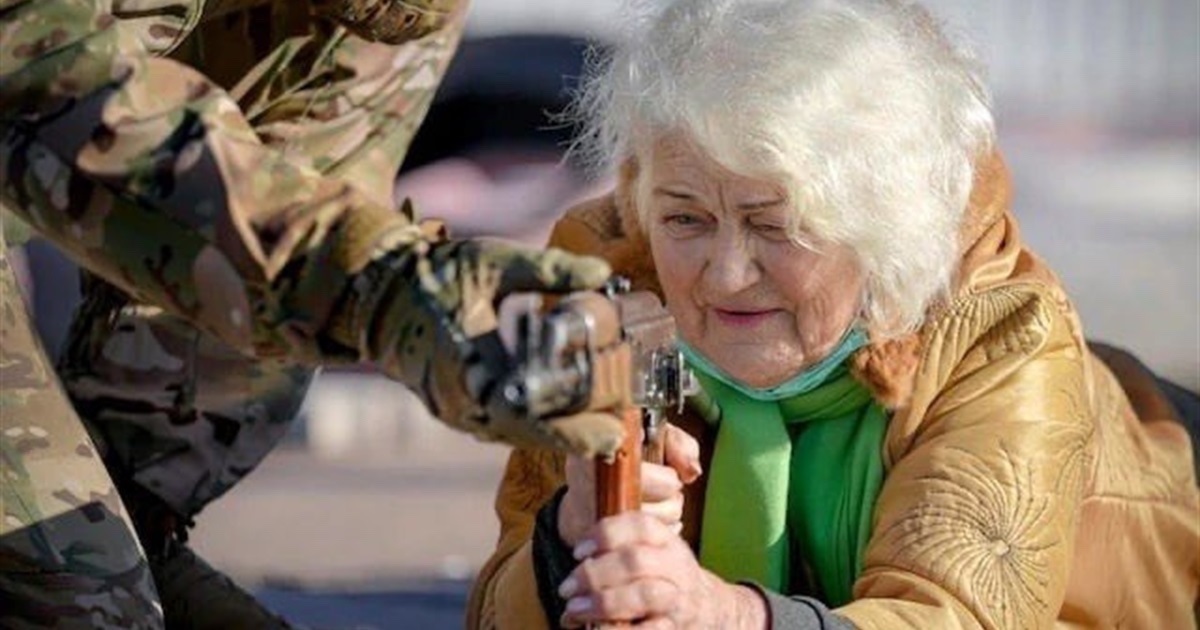 Territorial Defense training in Mariupol
Territorial Defense training in Mariupol
Just before the war started, I’d read on Facebook that civilian combat training would take place in the Illichivets sports center. But at first, my friends and I attended the first aid training. I made notes on my phone with all the important information: how to apply a tourniquet, how to give first aid to an injured person. Then my friends attended the lecture on bombs, while I went to the rifles. My dream finally came true.
I learned how to load a magazine, assemble and disassemble the rifle. I have finger arthritis, but I still wanted to do it. Then I saw how the youngsters were trained to stand, turn, stand on their knees, hold the rifle and then lie down. My decision was quick so I joined them from behind and started learning how to turn and stand on my knees…
Those watching me were probably bursting with laughter. But I was in my zone; I was learning something new. People took turns, new trainees would lay down. Then it was my turn. I saw an empty mat, lay down on it, and tried to aim. Suddenly the photographers came and I couldn’t see the target because of them. So I was shooing them away, “Move it, I can’t see the target,” and they were laughing and taking pictures. That’s how I became one of the heroes. Though I don’t see anything heroic in this. I just wanted to learn how to shoot.
The pictures from the training are the few ones I have left of the peaceful life in Mariupol. I didn’t get a chance to take anything else from that life with me.



